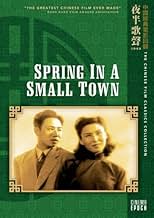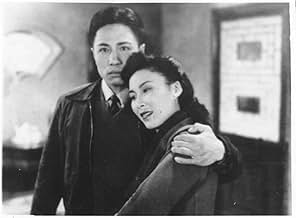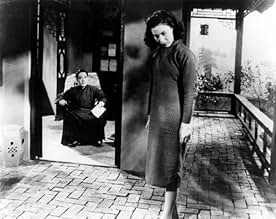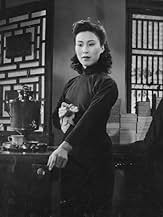IMDb RATING
7.3/10
3.6K
YOUR RATING
A lonely housewife finds her monotonous life altered when her childhood sweetheart returns to town.A lonely housewife finds her monotonous life altered when her childhood sweetheart returns to town.A lonely housewife finds her monotonous life altered when her childhood sweetheart returns to town.
- Awards
- 1 win total
- Director
- Writer
- All cast & crew
- Production, box office & more at IMDbPro
Featured reviews
This is a film about deep and unspoken human relationships.
Eventually they do become spoken, but is there a chance to change anything about the situation.
Originally made in Shanghai 1948 and quite free of propaganda the film introduces us to the Dai Family. There is still some weight about the history that surrounds the family. History usually has weight in Chinese literature and serious film.
A young married couple - Liyan, an invalid, and his wife Yuwen live in a once great family compound that is partially ruined.
A bright contrast is Liyan's young sister who cannot really remember the past of the family but accepts everything in quite a natural way. Her spirit is as bright as the other two are reserved.
Into this apparently stable world comes an unexpected visitor...
I ended up feeling quite sad - but definitely a superior film.
Eventually they do become spoken, but is there a chance to change anything about the situation.
Originally made in Shanghai 1948 and quite free of propaganda the film introduces us to the Dai Family. There is still some weight about the history that surrounds the family. History usually has weight in Chinese literature and serious film.
A young married couple - Liyan, an invalid, and his wife Yuwen live in a once great family compound that is partially ruined.
A bright contrast is Liyan's young sister who cannot really remember the past of the family but accepts everything in quite a natural way. Her spirit is as bright as the other two are reserved.
Into this apparently stable world comes an unexpected visitor...
I ended up feeling quite sad - but definitely a superior film.
If you are looking for a slice of life movie, look no further. A word of caution, however: this movie is a story, and a child of its time. There is no spectacular camera work, no epic soundtrack (or sound at all, for the most part), and certainly no special effects. Even the acting and dialogues are passable, at best. If you need any of these things to be immersed or even enjoy a movie, Spring in a Small Town is not for you.
There are four characters in the movie (and I mean four, there are no other supporting cast members or extras). The first two we are introduced are a couple, and they are "content". This is he best word to describe their situation, for they are not happy nor sad. You quickly realize that they have been frozen in time for years.
The conflict is created when an old friend (of both) comes back to town. This establishes the classic love triangle: the old friend has feelings for the wife, and she is torn between her own feelings towards him (or what she believes them to be) and those towards her husband.
There is little more to say about this movie without spoiling, except reiterate that this is a Chinese movie from the 40's. This is very much removed from the "factory assembled" plot lines that have plagued movies/books/video games/series for a long time.
If you were keeping track, the fourth character is the couple's caretaker, and he is a supporting character.
In the end, i still walk away with a lesson: no matter how much we think our life will stay the same, things will always happen. Whether they create change or not, is up to us.
There are four characters in the movie (and I mean four, there are no other supporting cast members or extras). The first two we are introduced are a couple, and they are "content". This is he best word to describe their situation, for they are not happy nor sad. You quickly realize that they have been frozen in time for years.
The conflict is created when an old friend (of both) comes back to town. This establishes the classic love triangle: the old friend has feelings for the wife, and she is torn between her own feelings towards him (or what she believes them to be) and those towards her husband.
There is little more to say about this movie without spoiling, except reiterate that this is a Chinese movie from the 40's. This is very much removed from the "factory assembled" plot lines that have plagued movies/books/video games/series for a long time.
If you were keeping track, the fourth character is the couple's caretaker, and he is a supporting character.
In the end, i still walk away with a lesson: no matter how much we think our life will stay the same, things will always happen. Whether they create change or not, is up to us.
"Spring in a Small Town" is a remarkable fusion of classic form and the convincingly real. It moves from its central character, Yuwen, who is isolated in a small town, and in an arranged marriage with an ill neurasthenic husband, Lyan; and moves too from a truly enduring acting job by Wei Wei as Yuwen.
The story revolves around memory: memory of love, and memory of a pre-war period of youthful promise. These moments of being are stirred to life by the visit of the husband's long estranged friend Zhang, who is now a city doctor. Zhang means renewed life and vigor at the desolate, war ruined estate of the noble Lyan, and love and passion to Yuwen, who happens to have been someone she once loved as a teen.
But Zhang's surprising appearance is more widening of vision than epiphanal. It's complicated by Yuwen's passionate desires and longings concentrated under the guise of romance, the doctor's scruples and detachment, her husband's illness, depression, and stoic passivity, and her sister-in-law's budding mutual relationship with Zhang. But there is no love triangle here, nor double love-triangle--something far more subtle is happening and it's happening in that whole arena suggestive of love and affection--one that extends into a range of human emotions, but is not romantic love itself.
Although there is clearly a patriarchal social world at work here, its oppressions are not exactly active in or bearing down on the two male and two female characters of this intimate drama. Each character has a kind of self-direction which comes from some inner sense of integrity, and acceptance of the life dealt them. They have deep emotions, but these are more felt than viewed. In other words, no one character dominates any other, so that each is free to call upon aspects of themselves which can result in self-determined responses and/or personal changes that are small but lasting adjustments.
The result is a world of stasis and intimacy which bears the physical-ness of the natural world. The characters seem to be as embodied as the stones of the ancient walls of the estate. They exist and move in a kind of equal world in which each senses the most minute emotion, movement, or thought in another--sometimes in soundless scenes. Honesty and simplicity arising from honoring the complexity of human-ness are what sets Fei Mu's film apart.
"Spring" is one of the most beautiful of all films because the things of beauty, sensuality, love, the natural world are more akin to hints than expressions. A breeze, spring sunshine, plants, the moon, water, fire are almost unnoticeably present, as are glimmering lights in an interior stillness. And all this bears more weight because of the period between war and change which seems to create a profounder environment. One in which the destruction of towns and persons is experienced in say the town's depopulation or the mild husband's bitterness and self-defeat. Yes, buildings and lives are equally vulnerable in Fei Mu's somewhat inconsolable world.
But "Spring" is as much about spring, as it is about the gravitas of war. Lyan's young sister Xiu has a youthful spontaneous presence which with all its trust, directness, driving sympathy pushes both her brother into re-connecting to memory, and her sister-in-law into and through the painful memory of Zhang's failure to be in love with her back then.
In the end, Yuwen may not be less alone, but she is more in sync with her husband's now awakened life and affection and more in touch with her own emotional life which was deeper than what she understood it to be. Dr. Zhang and Liyan do not answer her passions, but they have both contributed to her more certain grasp of them. There is a touch of sadness at end though, because the male social structures are still in place and Yuwen needs a fuller life--it's perhaps promised in her sister-in-laws embrace of all that must await both women.
The story revolves around memory: memory of love, and memory of a pre-war period of youthful promise. These moments of being are stirred to life by the visit of the husband's long estranged friend Zhang, who is now a city doctor. Zhang means renewed life and vigor at the desolate, war ruined estate of the noble Lyan, and love and passion to Yuwen, who happens to have been someone she once loved as a teen.
But Zhang's surprising appearance is more widening of vision than epiphanal. It's complicated by Yuwen's passionate desires and longings concentrated under the guise of romance, the doctor's scruples and detachment, her husband's illness, depression, and stoic passivity, and her sister-in-law's budding mutual relationship with Zhang. But there is no love triangle here, nor double love-triangle--something far more subtle is happening and it's happening in that whole arena suggestive of love and affection--one that extends into a range of human emotions, but is not romantic love itself.
Although there is clearly a patriarchal social world at work here, its oppressions are not exactly active in or bearing down on the two male and two female characters of this intimate drama. Each character has a kind of self-direction which comes from some inner sense of integrity, and acceptance of the life dealt them. They have deep emotions, but these are more felt than viewed. In other words, no one character dominates any other, so that each is free to call upon aspects of themselves which can result in self-determined responses and/or personal changes that are small but lasting adjustments.
The result is a world of stasis and intimacy which bears the physical-ness of the natural world. The characters seem to be as embodied as the stones of the ancient walls of the estate. They exist and move in a kind of equal world in which each senses the most minute emotion, movement, or thought in another--sometimes in soundless scenes. Honesty and simplicity arising from honoring the complexity of human-ness are what sets Fei Mu's film apart.
"Spring" is one of the most beautiful of all films because the things of beauty, sensuality, love, the natural world are more akin to hints than expressions. A breeze, spring sunshine, plants, the moon, water, fire are almost unnoticeably present, as are glimmering lights in an interior stillness. And all this bears more weight because of the period between war and change which seems to create a profounder environment. One in which the destruction of towns and persons is experienced in say the town's depopulation or the mild husband's bitterness and self-defeat. Yes, buildings and lives are equally vulnerable in Fei Mu's somewhat inconsolable world.
But "Spring" is as much about spring, as it is about the gravitas of war. Lyan's young sister Xiu has a youthful spontaneous presence which with all its trust, directness, driving sympathy pushes both her brother into re-connecting to memory, and her sister-in-law into and through the painful memory of Zhang's failure to be in love with her back then.
In the end, Yuwen may not be less alone, but she is more in sync with her husband's now awakened life and affection and more in touch with her own emotional life which was deeper than what she understood it to be. Dr. Zhang and Liyan do not answer her passions, but they have both contributed to her more certain grasp of them. There is a touch of sadness at end though, because the male social structures are still in place and Yuwen needs a fuller life--it's perhaps promised in her sister-in-laws embrace of all that must await both women.
"Spring in a Small Town" is a very simple movie--a simple premise, a small cast and it's all done in a very restrained manner. It's a definite example of minimalistic cinema and is worth your time.
The film is set in rural China--just a year before the Communist takeover. Liyan is sickly--with tuberculosis. However, his main problem is depression--he feels very sorry for himself and has no will to do anything. Most of the time, he just sits outside and broods. Not surprisingly, his wife (Yuwen) is not happy but is quite dutiful towards her husband. Into this sad family comes a surprise visit from one of Liyan's old friends who he hasn't seen in a decade. But it gets more complicated. The friend (Zhang) is shocked to see that Liyan's wife is his old lover!! Not surprisingly, he and Yuwen say nothing and at first, they keep their distance. Where does all this go? It probably doesn't go exactly where you expect....see it and find out for yourself.
My score of 8 is awfully high for such a simple film, but I was impressed that the movie was handled so simply and honestly. My only complaint, and you can't blame the filmmakers, is that the quality of the DVD print is pretty poor. My assumption is that Cinema Epoch did not have access to a better copy--though it would be nice to see this film restored to eliminate the scratches and clean everything up a bit.
The film is set in rural China--just a year before the Communist takeover. Liyan is sickly--with tuberculosis. However, his main problem is depression--he feels very sorry for himself and has no will to do anything. Most of the time, he just sits outside and broods. Not surprisingly, his wife (Yuwen) is not happy but is quite dutiful towards her husband. Into this sad family comes a surprise visit from one of Liyan's old friends who he hasn't seen in a decade. But it gets more complicated. The friend (Zhang) is shocked to see that Liyan's wife is his old lover!! Not surprisingly, he and Yuwen say nothing and at first, they keep their distance. Where does all this go? It probably doesn't go exactly where you expect....see it and find out for yourself.
My score of 8 is awfully high for such a simple film, but I was impressed that the movie was handled so simply and honestly. My only complaint, and you can't blame the filmmakers, is that the quality of the DVD print is pretty poor. My assumption is that Cinema Epoch did not have access to a better copy--though it would be nice to see this film restored to eliminate the scratches and clean everything up a bit.
Xiao Chen Zhi Chun is a great movie, not only in the year it was shot but also now. It's an art movie which is not outdated even in 21st century. The director maintained a good narrative skill and thus made the story so smooth!
The movie reminds me of the later French new wave movie: Francois Truffaut's "Femme d'a cote" which is of the similar topic.
The movie reminds me of the later French new wave movie: Francois Truffaut's "Femme d'a cote" which is of the similar topic.
Did you know
- TriviaVoted the best Chinese-language film of all time by the Hong Kong Film Academy in 2004.
- Alternate versionsThere is an Italian edition of this film on DVD, distributed by DNA Srl: " PRIMAVERA IN UNA PICCOLA CITTÀ (Spring in a Small Town, 1948) + LA DEA (The Goddess, 1934)" (2 Films on a single DVD). The film has been re-edited with the contribution of film historian Riccardo Cusin. This version is also available for streaming on some platforms.
- ConnectionsFeatured in Venice 70: Future Reloaded: Zhangke Jia (2013)
- How long is Spring in a Small Town?Powered by Alexa
Details
- Release date
- Country of origin
- Language
- Also known as
- Spring in a Small Town
- Production company
- See more company credits at IMDbPro
- Runtime1 hour 38 minutes
- Color
- Sound mix
- Aspect ratio
- 1.37 : 1
Contribute to this page
Suggest an edit or add missing content

Top Gap
By what name was Le printemps d'une petite ville (1948) officially released in India in English?
Answer






















